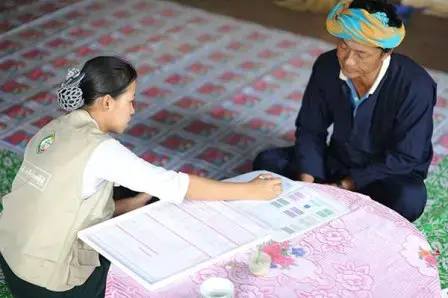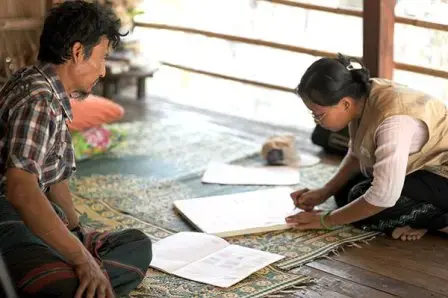Myitkyina, Kachin State - UNFPA is conducting extensive training for civil society organizations (CSOs) and their networks to build capacity on how to interpret the census data and use it for local development and planning. Underpinning these efforts is that the success of the census is measured by how broadly and effectively the results are used for planning and programming, not just by Government but by the people of Myanmar. UNFPA and the Myanmar government are rolling out an ambitious training programme, with teams made up of both government staff and civil society representatives, who will cascade the training through States to Districts, reaching an estimated 5,460 local stakeholders across the country between October and December 2015.
In Myitkyina, Kachin State, a three day workshop at the District level took place from 12th October - 14th October 2015. The workshop was led by at a team of three facilitators; one from the immigration office at the district level, an immigration officer from the Department of Population and a facilitator from a CSO. The workshop provided a conducive atmosphere for open dialogue about the census data and initiated discussions on how census data clarified specific development issues and challenges in Kachin State.
A total of 57 participants attended the training in Myitkyina. Ma Myint Myint Toe, an English teacher at the University of Computer Studies in Myitkyina said: “The census data will help develop our Nation and can improve conditions in Kachin State, particularly in remote areas such as Putao where many children cannot attend school regularly due to poverty, a lack of transportation and accommodation for teachers.”
Increasingly through these trainings, people are beginning to understand the value of the census data and are more aware that the census was not simply a headcount of the population. Further trainings will be conducted for CSOs next years.
As Ma Thin Thin Myat, a volunteer with the Red Cross in Myitkyina said: “When delivering first aid kits we need to know the size of the population in a specific area, therefore this information will help us.” This truly illustrates the importance of Myanmar having accurate data for the first time in more than three decades. Policy, planning and services improvement in areas such as education, job creation, amenities, and health services can now be developed based on hard data which will increase the impact of programmes and ensure that resources are directed to those areas that need them most.




